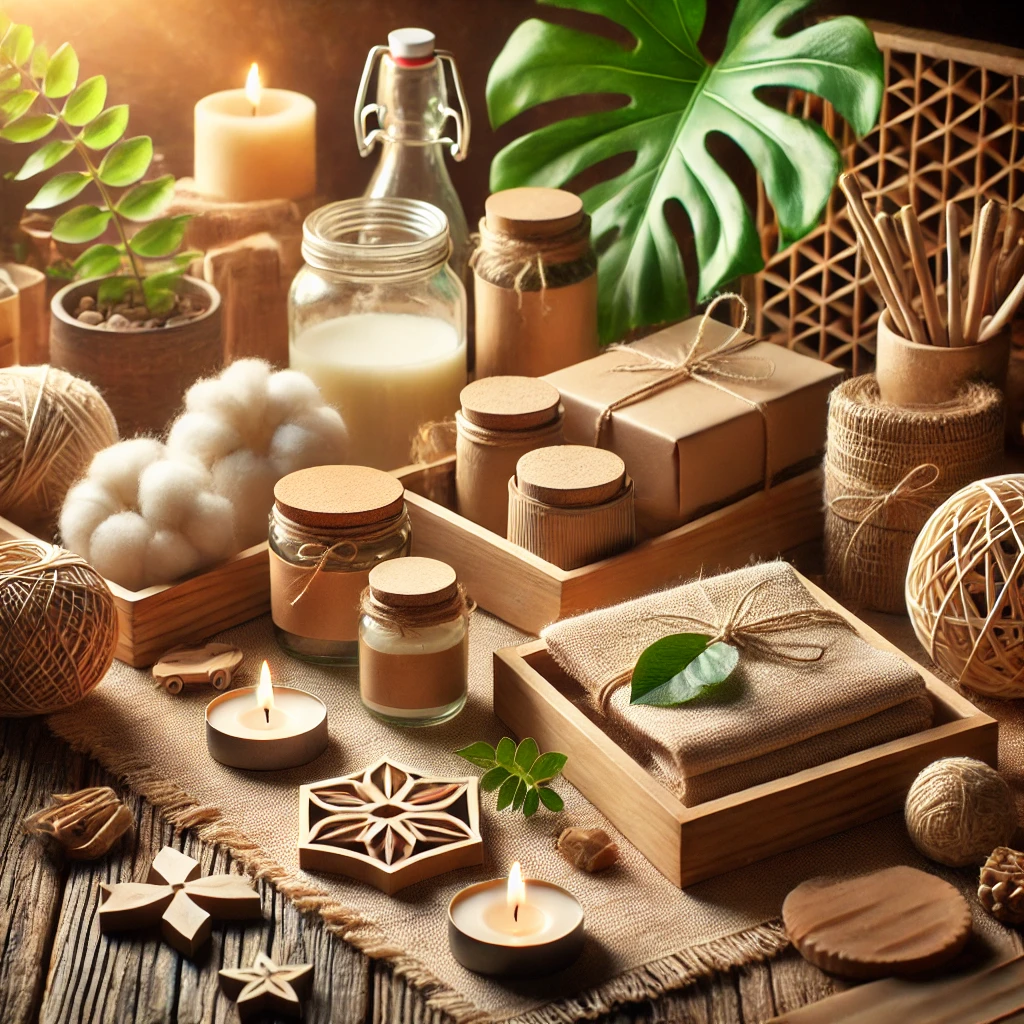News
The Eco-Friendly Benefits of Choosing Handmade Products
In recent years, environmental awareness has become a significant driving force behind consumer behavior. As people become more mindful of the impact their purchases have on the planet, they are looking for sustainable, eco-friendly alternatives to mass-produced goods. One category that has seen a marked rise in demand is handmade products. Handmade goods offer not only unique designs and superior craftsmanship but also a range of environmental benefits that appeal to eco-conscious consumers.
This article will explore the eco-friendly advantages of choosing handmade products and why they’re a better choice for those seeking to reduce their environmental footprint.
1. Reduced Environmental Impact of Production
- Keywords: eco-friendly handmade, sustainable production, low-impact crafting, small-batch production
- Why It’s Important: Mass production of goods, especially in large factories, typically involves high levels of energy consumption, extensive use of water, and the release of harmful pollutants. On the other hand, handmade products are often created in small batches, which significantly reduces their environmental impact.
Artisans working on handmade products generally use fewer resources than large-scale manufacturers. Since handmade goods are typically produced in smaller quantities or made to order, there is less waste involved. Additionally, many artisans focus on using sustainable production methods, such as handcrafting goods without the use of electricity-intensive machinery.
- Example: A handmade soap business might use organic oils, minimal packaging, and cold-process methods, which are less resource-intensive than large-scale soap production factories. These eco-conscious production choices make handmade soap a much more environmentally friendly option.
2. Ethically Sourced and Sustainable Materials
- Keywords: sustainable materials, ethical sourcing, eco-friendly raw materials, organic crafts
- Why It’s Important: Many handmade artisans take pride in using ethically sourced, sustainable, and natural materials in their work. This focus on sustainability not only ensures higher quality products but also reduces the impact on the environment. By avoiding synthetic, non-biodegradable materials, handmade goods are often biodegradable, recyclable, or made from renewable resources.
Common eco-friendly materials used in handmade products include:
- Organic cotton or hemp in textiles
- Recycled metals for jewelry
- Bamboo or reclaimed wood for home goods
- Plant-based dyes in clothing and décor
These materials are often harvested and processed in ways that have less impact on the environment compared to their industrially manufactured counterparts. Additionally, artisans often have a direct connection to their suppliers, ensuring that the materials are ethically sourced, with fair wages and sustainable farming practices.
3. Less Waste and Overproduction
- Keywords: zero waste production, handmade minimal waste, sustainable production methods
- Why It’s Important: One of the most significant environmental issues with mass production is overproduction and the resulting waste. Factories often produce goods in vast quantities, leading to excess stock that may never be sold and often ends up in landfills. Handmade businesses, however, tend to operate on a much smaller scale, producing only what is needed or made to order.
By producing items in small batches or on demand, handmade artisans significantly reduce waste. In many cases, leftover materials are repurposed for future projects, further minimizing the environmental footprint.
- Example: A leatherworker might use leftover pieces of leather from larger projects to create smaller items like keychains or wallets, ensuring that no material goes to waste.
4. Lower Carbon Footprint
- Keywords: low carbon footprint, local craftsmanship, handmade eco benefits, carbon-conscious products
- Why It’s Important: One of the major environmental benefits of handmade products is their typically lower carbon footprint. Large-scale manufacturing requires the transportation of raw materials to factories, followed by shipping finished goods across long distances to distributors and retailers. This entire supply chain contributes significantly to carbon emissions.
Handmade goods, especially when produced by local artisans, tend to have a shorter supply chain. Many artisans source materials locally, further reducing transportation-related carbon emissions. Additionally, consumers can often purchase handmade goods directly from the maker, eliminating the need for middlemen and further reducing the carbon footprint.
- Example: Buying a handmade ceramic mug from a local potter means that the mug is not traveling across continents to reach you, unlike many mass-produced products. This significantly reduces the overall environmental impact.
5. Eco-Friendly Packaging
- Keywords: sustainable packaging, zero waste packaging, eco-conscious packaging, plastic-free handmade
- Why It’s Important: Packaging is one of the largest contributors to environmental waste, especially plastic packaging that is prevalent in mass-produced goods. Many handmade businesses are leading the way in adopting eco-friendly packaging practices, such as using recycled or biodegradable materials and minimizing unnecessary packaging.
Artisans often use:
- Recyclable paper for wrapping products
- Biodegradable materials such as kraft paper or jute
- Recycled cardboard boxes for shipping
- Compostable packaging made from plant-based materials
By choosing minimalistic, sustainable packaging, handmade businesses not only reduce waste but also set an example for larger companies to follow. Some artisans even allow customers to return packaging for reuse, contributing to a circular economy.
6. Support for Local and Sustainable Economies
- Keywords: support local artisans, sustainable economies, community impact, handmade economy
- Why It’s Important: When consumers purchase handmade products, they are not just buying an item; they are supporting a local artisan, craftsperson, or small business owner. This support helps strengthen local economies, providing livelihoods for artisans who often practice sustainable and ethical production methods.
Handmade businesses typically operate within their own communities, creating products that reflect local culture and resources. This local focus not only benefits the environment by reducing transportation and carbon emissions, but it also fosters a more sustainable economy. Artisans often invest back into their communities, buying materials from local suppliers and employing sustainable practices that benefit the local ecosystem.
7. Longer Lifespan and Durability
- Keywords: durable handmade products, long-lasting crafts, high-quality eco goods, reduce consumption
- Why It’s Important: Handmade products are often crafted with care and attention to detail, resulting in higher-quality items that last longer than their mass-produced counterparts. Durable, well-made products reduce the need for frequent replacements, which in turn reduces waste and overconsumption.
By investing in a high-quality handmade item, consumers can avoid contributing to the throwaway culture that has led to environmental degradation. When products last longer, they have a lower environmental impact over time.
- Example: A handmade leather wallet or a handcrafted wooden chair is likely to last for years, if not decades, reducing the need for frequent replacements and minimizing waste.
8. Personal and Emotional Value
- Keywords: meaningful handmade products, emotional connection, personal value, eco-friendly lifestyle
- Why It’s Important: Handmade goods often carry a personal and emotional value that mass-produced items simply cannot match. When consumers purchase handmade products, they are often supporting a cause or an artisan’s livelihood, and this connection adds a deeper meaning to the item.
This emotional attachment encourages consumers to take better care of handmade products, repair them when needed, and hold onto them for longer periods. The longevity of these items means they are less likely to end up in landfills, further contributing to a more sustainable lifestyle.
Conclusion
Handmade products offer a wide range of eco-friendly benefits that align with the growing demand for sustainability and conscious consumerism. From reduced environmental impact and sustainable materials to lower carbon footprints and waste reduction, handmade goods are a powerful alternative to mass-produced items. By choosing handmade, consumers are not only investing in unique, high-quality products but also supporting local artisans and contributing to a more sustainable and eco-friendly future.
As environmental concerns continue to shape the way people shop, the appeal of handmade goods is only expected to grow. Whether you’re looking to reduce your environmental impact or simply appreciate the beauty of handmade craftsmanship, opting for handmade products is a small but impactful way to make a positive difference for the planet.

